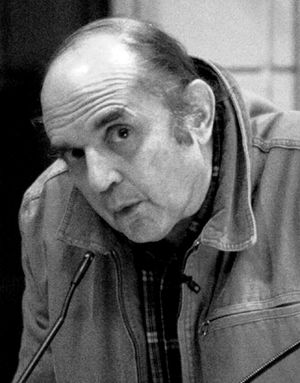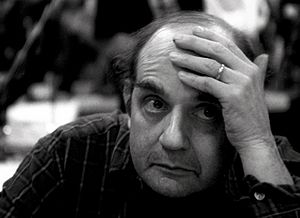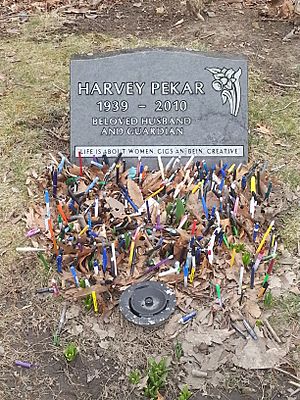Harvey Pekar facts for kids
Quick facts for kids
Harvey Pekar
|
|
|---|---|
 |
|
| Born | Harvey Lawrence Pekar October 8, 1939 Cleveland, Ohio, U.S. |
| Died | July 12, 2010 (aged 70) Cleveland Heights, Ohio, U.S. |
| Occupation |
|
| Genre | Underground comics Alternative comics |
| Subject | Autobiography |
| Years active | 1959–2010 |
| Notable works | American Splendor Our Cancer Year |
| Notable awards |
|
| Spouses |
Karen Delaney
(m. 1960; div. 1972)Helen Lark Hall
(m. 1977; div. 1981)Joyce Brabner
(m. 1984) |
Harvey Lawrence Pekar (October 8, 1939 – July 12, 2010) was an American comic book writer. He was best known for his autobiographical comic series, American Splendor. This series showed his everyday life in Cleveland, Ohio. In 2003, a popular movie was made based on his comics.
Many people called Pekar the "poet laureate of Cleveland." He helped change how people saw graphic novels and comics that tell real-life stories. Pekar said his work was "autobiography written as it's happening." He wanted to show the challenges of staying alive, finding a job, and having a place to live. He believed life was a constant struggle, and he tried to control a chaotic world.
Harvey Pekar won several awards for his work. These included the Inkpot Award, the American Book Award, and a Harvey Award. After he passed away, he was added to the Eisner Award Hall of Fame.
Contents
Life Story of Harvey Pekar
Harvey Pekar was born in Cleveland, Ohio, on October 8, 1939. He had a younger brother named Allen. His parents, Saul and Dora Pekar, were Jewish immigrants from Poland. His father owned a grocery store, and the family lived above it. Harvey said he wasn't very close to his parents because they worked all the time. However, he admired their strong love for each other.
As a child, Pekar's first language was Yiddish. He learned to read and enjoy novels in Yiddish.
Pekar had a tough childhood and didn't have many friends at first. His neighborhood changed, and he was often picked on. This made him feel like he wasn't good enough. But it also taught him to stand up for himself.
He finished high school at Shaker Heights High School in 1957. After that, he served briefly in the United States Navy. He then went to Case Western Reserve University but left after one year. He worked many different odd jobs. In 1965, he got a job as a file clerk at the Veterans Administration Hospital. He kept this job even after he became famous. He worked there until he retired in 2001.
Pekar was married three times. His first marriage was to Karen Delaney from 1960 to 1972. His second wife was Helen Lark Hall, whom he married in 1977. She appeared as "Lark" in some of his early American Splendor comics. They divorced in 1981.
In 1984, Pekar married writer Joyce Brabner. She became a regular character in his American Splendor comics.
In 1990, Pekar was diagnosed with lymphoma, a type of cancer. He needed chemotherapy treatment. This was a very worrying time for him and Joyce. After he recovered, he and Joyce wrote a graphic novel about their experience. It was called Our Cancer Year and came out in 1994. It told the story of his difficult but successful treatment.
Around the same time, Joyce and Harvey became guardians for a young girl named Danielle Batone. She was nine years old when she came to live with them. Danielle became their foster daughter and also appeared in American Splendor comics.
Harvey Pekar lived in Cleveland Heights, Ohio, with Joyce and Danielle.
Harvey Pekar's Career
Starting in Comics
Harvey Pekar became friends with cartoonist Robert Crumb because they both loved jazz records. This friendship led to Pekar creating his own comic book series, American Splendor. Pekar had thought about making comics for about ten years. He was inspired by writers like James Joyce and Arthur Miller.
Around 1972, Pekar drew some simple stories with stick figures. He showed them to Crumb and another artist, Robert Armstrong. They were impressed and offered to draw the stories for him. Pekar's first published comic work was "Crazy Ed" with Robert Crumb. It appeared on the back cover of Crumb's The People's Comics in 1972. Before American Splendor #1 came out, Pekar wrote other comic stories for different publications.
American Splendor Comics
The first issue of Pekar's self-published comic series, American Splendor, came out in May 1976. Artists like Crumb, Dumm, Budgett, and Brian Bram drew the stories. The comics used a very honest style to show Pekar's daily life in Cleveland.
Pekar and his work became more well-known in 1986. That year, a book called American Splendor: The Life and Times of Harvey Pekar collected many of his early comics. It received good reviews, including one from The New York Times. Also in 1986, Pekar started appearing on the TV show Late Night with David Letterman.
Pekar published 15 issues of American Splendor himself from 1976 to 1991. Later, Dark Horse Comics published his comics from 1993 to 2003. In 2006, Pekar released a new four-issue American Splendor series through DC Comics' Vertigo imprint. This was collected in a paperback book. Another four-issue series followed in 2008.
Many artists worked with Pekar on American Splendor. Some of his most frequent collaborators included Crumb, Dumm, Budgett, Spain Rodriguez, and Joe Sacco. In the 2000s, he often worked with Dean Haspiel and Josh Neufeld. Even his wife, Joyce Brabner, and famous comics writer Alan Moore drew for him.
Besides his own life stories, Pekar also wrote biographies in comic form. One of these was American Splendor: Unsung Hero (2003). It was drawn by David Collier and told the story of Robert McNeill. McNeill was one of Pekar's coworkers at the VA hospital and a Vietnam War veteran.
Stories from the American Splendor comics have been collected in many books.
The American Splendor Film
A movie based on American Splendor was released in 2003. It was directed by Robert Pulcini and Shari Springer Berman. Paul Giamatti played Harvey Pekar in the film. Harvey Pekar himself, along with his wife Joyce, foster daughter Danielle, and coworker Toby Radloff, also appeared in the movie.
The American Splendor film won several awards. It received the Grand Jury Prize at the 2003 Sundance Film Festival. It also won the award for Best Adapted Screenplay from the Writers Guild of America. At the 2003 Cannes Film Festival, it won the FIPRESCI critics award. The movie was also nominated for an Academy Award for Best Adapted Screenplay in 2003. Pekar wrote about how the movie affected his life in a comic called American Splendor: Our Movie Year.
Other Comic Books and Writing
On October 5, 2005, Vertigo published Pekar's autobiographical book The Quitter. It had artwork by Dean Haspiel and told the story of Pekar's younger years.
In 2006, Ballantine published his biography Ego & Hubris: The Michael Malice Story. In 2007, Pekar worked with Heather Roberson and artist Ed Piskor on the book Macedonia. This book was about Roberson's studies in that country. In 2008, a book called Students for a Democratic Society: A Graphic History was published. In 2009, he released The Beats, a history of the Beat Generation with art by Ed Piskor. He also published Studs Terkel's Working: A Graphic Adaptation in 2009.
In 2010, Pekar started a webcomic called The Pekar Project with Smith. In 2011, a book called Yiddishkeit was published. Pekar co-edited it, and it showed different parts of Yiddish language and culture.
Pekar was also a big record collector. He wrote many articles about jazz music and books. He wrote for magazines like DownBeat and The Village Voice. He also wrote notes for music albums. Pekar had a regular column called "Harvey Sez" in the comics magazine Weirdo. He also won awards for his essays that were broadcast on public radio.
Media Appearances
Harvey Pekar's success with his comics led to him appearing on Late Night with David Letterman on October 15, 1986. He was invited back several times. These appearances became famous for his honest and sometimes heated discussions with Letterman. Pekar appeared in Alan Zweig's 2000 documentary film about record collecting, Vinyl. In August 2007, Pekar was featured on the Cleveland episode of Anthony Bourdain: No Reservations.
In 2009, Pekar made his first appearance in a play called Leave Me Alone!. It was a jazz opera for which Pekar wrote the story. In 2009, Pekar was also featured in The Cartoonist, a documentary film about cartoonist Jeff Smith.
Death and Legacy
Harvey Pekar passed away on July 12, 2010. He was buried at Lake View Cemetery in Cleveland.
Some of Pekar's works were planned to be released after his death. These included two books with Joyce Brabner. In December 2010, the last story Pekar wrote was published. It was called "Harvey Pekar Meets the Thing" and appeared in a Marvel Comics book. In this story, Pekar has a conversation with the comic book character Ben Grimm.
Pekar is often called the "poet laureate of Cleveland." He helped change how people saw graphic novels and comics that tell real-life stories. His American Splendor series is considered one of the most important comic series ever. Pekar was one of the first authors to openly share his life stories in comic books. Today, many people write about their lives online, but Harvey Pekar was doing this long before it became common.
In October 2012, a statue of Pekar was placed at the Cleveland Heights-University Heights Library. He visited this library almost every day. On July 25, 2015, the city of Cleveland Heights, Ohio, named a corner after him. This area is now known as Harvey Pekar Park.
Awards and Recognition
- 1986: Inkpot Award
- 1987: American Book Award for American Splendor: The Life and Times of Harvey Pekar
- 1995: Harvey Award for Best Graphic Album of Original Work (for Our Cancer Year)
- 2000: PRNDI (Public Radio News Directors Incorporated) Commentary/Essay first prize for "What's in a Name"
- 2001: RTNDA (Radio-Television News Directors Association) Regional Edward R. Murrow Award for Best Writing for "Father's Day"
- 2011: Eisner Award Hall of Fame
Images for kids
See also
 In Spanish: Harvey Pekar para niños
In Spanish: Harvey Pekar para niños
 | Lonnie Johnson |
 | Granville Woods |
 | Lewis Howard Latimer |
 | James West |






